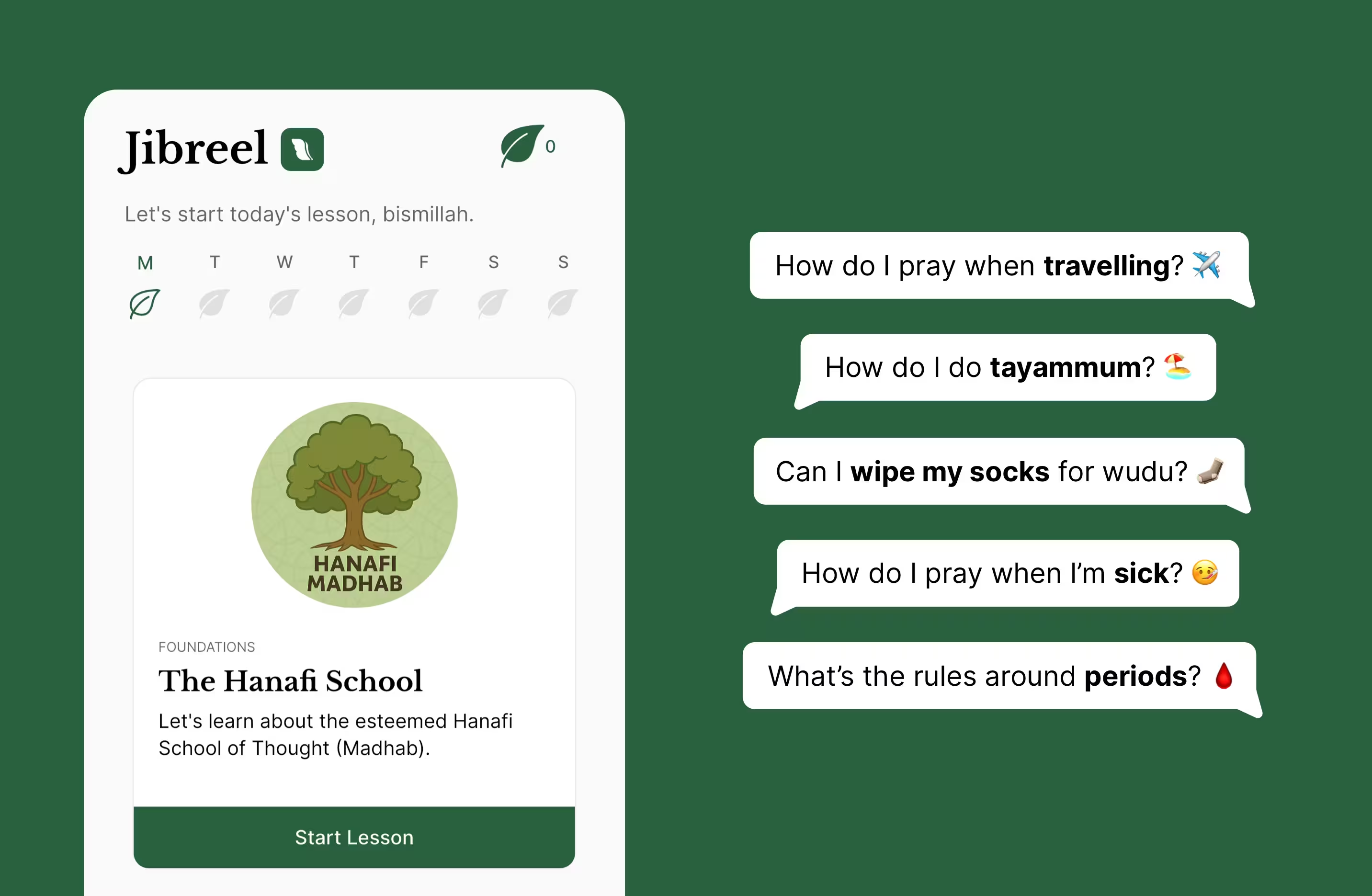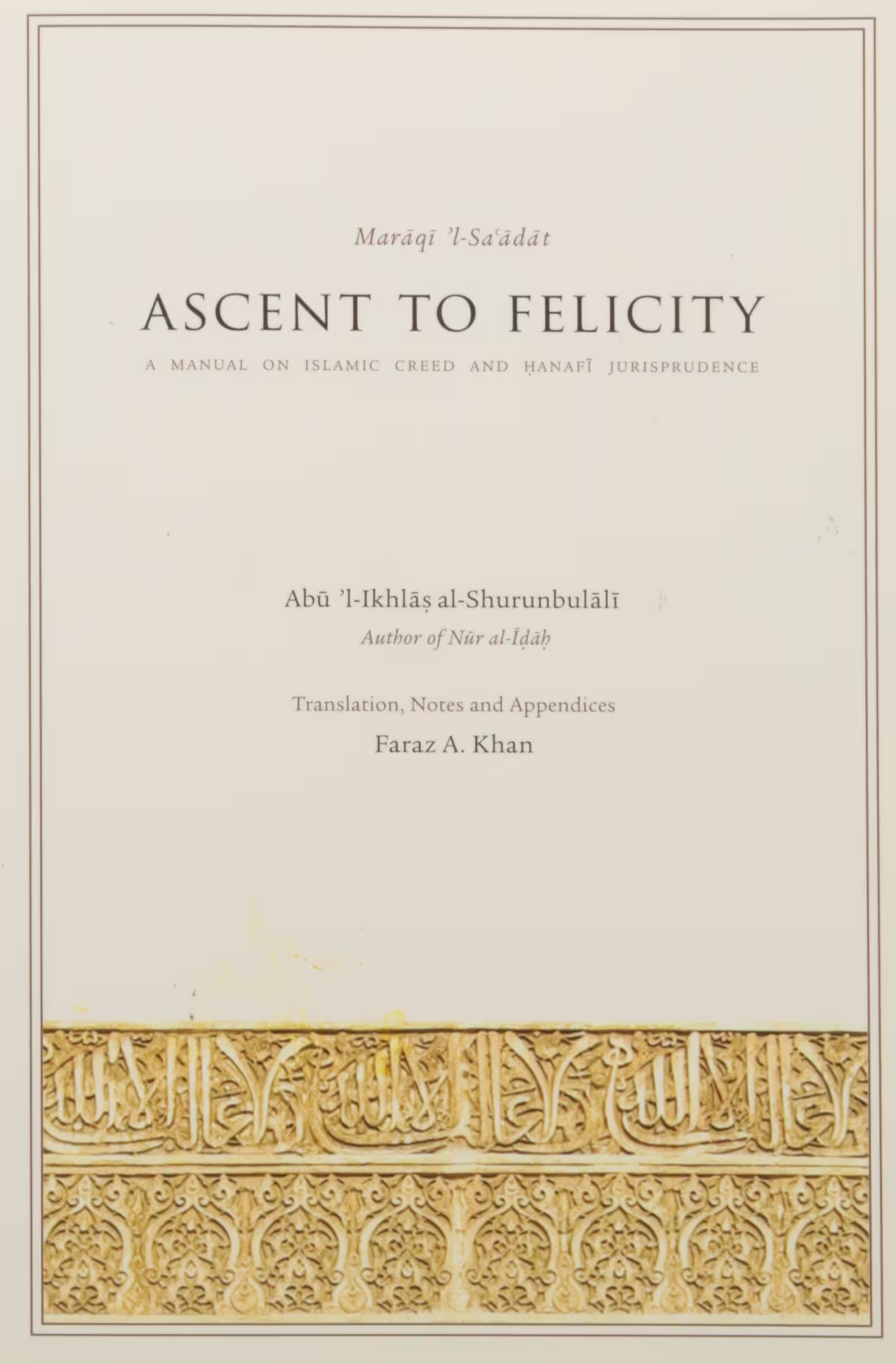Learning fiqh - the practical rules of Islam - is essential for every Muslim. As a layperson, you have various convenient options to study Islamic jurisprudence, whether through modern technology or traditional methods.
There are many resources available, including books, online courses, and local classes, each with their own advantages.
Below are seven of the best ways to learn fiqh. We also note which madhab (Islamic school of thought) each resource focuses on, so you can choose what fits your background.
1. Learn Fiqh with the Jibreel App – Interactive Hanafi Learning

One of the easiest ways to begin learning fiqh is through the Jibreel App, a break-through mobile application often dubbed the “Duolingo for Islamic Knowledge.”. It's based on authentic texts and content is written and reviewed by fiqh scholars.
This app offers fun, interactive lessons that take just 5 minutes a day, guiding you through all the obligatory Islamic knowledge (farḍ ʿayn) you must know – starting with fiqh basics.
The Jibreel App currently teaches according to the Hanafi school, the largest of the Sunni madhabs, with other schools of thought like the Shafi coming soon.
It covers everyday scenarios (purification, prayer, fasting, etc.) and common questions a Muslim might have, like “Can I wipe over socks for wudu?” or “How do I pray when traveling?” .
The bite-sized, quiz-style format makes it engaging and easy to retain information. If you’re a busy person who wants a game-like learning experience whilst you're on your commute, waiting for coffee or just after you pray, the Jibreel App is an excellent resource.
2. Read Ascent to Felicity – A Beginner’s Hanafi Fiqh Manual

Another effective way to learn fiqh is by reading a reliable beginner-friendly book. One highly recommended text is Ascent to Felicity (Marāqī ’l-Saʿādat), which is a concise yet comprehensive primer on Islamic creed and Hanafi jurisprudence.
Originally written by the 11th-century Hanafi scholar Imam al-Shurunbulali, this manual covers all five pillars of Islam (faith, prayer, fasting, zakat, and hajj) as well as practical topics like dietary laws, ritual purity, and more.
The English translation by Faraz A. Khan includes helpful explanatory notes and even appendices with prophetic supplications and etiquette. Because it is organized by topic and presented in clear language, Ascent to Felicity allows a beginner to systematically learn the Hanafi rulings for worship and daily life. Reading such a book at your own pace is beneficial – you get in-depth coverage and can always refer back to it.
If you prefer self-study and want a solid foundation in Hanafi fiqh, this book is an ideal resource. The Jibreel App is based on this book if you want an interactive way to go through it and questions to test your understanding and practical implementation!
3. Online Fiqh Courses on SeekersGuidance (Hanafi & Shafiʿi)
If you learn best with structured courses and teacher guidance, consider enrolling in online fiqh classes. SeekersGuidance is a well-known platform that offers online courses on Islamic studies, including dedicated tracks for both Hanafi and Shafiʿi fiqh.
SeekersGuidance has an Islamic Studies Curriculum with step-by-step courses from absolute basics up to advanced topics. For example, beginners can start with courses like “Absolute Essentials of Islam (Hanafi)” or its Shafiʿi equivalent, which teach the fundamentals of worship according to each school. Because the courses are online, you can learn at your own pace from anywhere, enjoying the convenience of home study.
Yet you still get the benefit of qualified instructors who answer questions and provide feedback. In fact, SeekersGuidance even has live sessions and an answer service for student queries. This makes it a great way to learn fiqh under the guidance of scholars. Whether you follow Hanafi or Shafiʿi teachings, SeekersGuidance’s curated courses ensure you build a solid foundation without any cost.
4. Join Safina Society’s Arkview Program – Structured Learning in All Madhabs
Another excellent resource is Safina Society’s Arkview learning program. Safina Society is an educational initiative (headed by Dr. Shadee Elmasry and others) that runs online classes for busy people. Through their Arkview platform, you can “learn systematically, ask questions, and deepen your knowledge from home” as part of a virtual learning community.
One big advantage of Safina Society is that they offer classes in all four Sunni madhhabs (Hanafi, Shafiʿi, Maliki, and Hanbali) for fiqh subjects. This means you can study whichever school of law you follow, or even attend courses to learn the differences. They have beginner-level courses (covering essentials of worship, creed, etc.) and more advanced classes in fiqh and other sciences, taught by qualified instructors.
The structured curriculum and live interactive format help turn a passive viewer into an active student of knowledge. By joining Arkview, you’ll get the feel of a part-time seminary from the comfort of home – including the ability to engage with teachers and fellow students. For those who want a more guided study experience covering any madhab, Safina Society provides a reliable and interactive way to learn fiqh.
5. Attend Local Fiqh Classes at Your Mosque or Islamic Center
Don’t overlook the traditional method of learning directly from scholars in person. Many local mosques and Islamic centers offer fiqh classes or study circles for the community. Attending a class at your local mosque gives you the benefit of face-to-face learning in a spiritual environment. You can engage with an imam or teacher, ask questions on the spot, and get clarifications tailored to your context.
Learning in a mosque also connects you with fellow local Muslims who are studying, building a support network. In fact, local classes encourage community engagement and often provide a motivating, uplifting atmosphere for students . For example, a mosque might have a weekly class on the fiqh of purification and prayer, or a monthly workshop on zakat calculations before Ramadan.
These sessions usually follow the madhhab predominant in your community (for instance, many UK and US mosques teach Hanafi fiqh if the community is of South Asian origin, or Shafiʿi if the imam is from an Arab / Levantine background). By joining these classes, you get hands-on learning – sometimes even practical demonstrations – that help apply fiqh principles in real life.
Check the events bulletin of your nearest Islamic center and you’re likely to find beginner-friendly fiqh courses.
Conclusion
For English-speaking Muslims, learning fiqh has never been more accessible. You can learn Islamic jurisprudence through interactive apps like Jibreel, classic books like Ascent to Felicity, structured online courses via SeekersGuidance or Safina Society, as well as local classes and seminars. Each of these methods caters to different learning styles - whether you prefer self-study, guided lessons, community interaction, or on-demand learning. The key is to be consistent and, most importantly, to start with the basics according to one of the established schools of thought.
With sincere effort and the help of these resources, you’ll gain the knowledge to practice your faith with confidence and accuracy. Fiqh is a journey of understanding how to live as a Muslim day-to-day, so take the first step with the method that suits you best.
Happy learning, and may Allah bless you in your quest for knowledge. Remember, seeking knowledge is an obligation on every Muslim!


















.avif)

Lorem ipsum dolor sit amet, consectetur adipiscing elit. Suspendisse varius enim in eros elementum tristique. Duis cursus, mi quis viverra ornare, eros dolor interdum nulla, ut commodo diam libero vitae erat. Aenean faucibus nibh et justo cursus id rutrum lorem imperdiet. Nunc ut sem vitae risus tristique posuere.
Lorem ipsum dolor sit amet, consectetur adipiscing elit. Suspendisse varius enim in eros elementum tristique. Duis cursus, mi quis viverra ornare, eros dolor interdum nulla, ut commodo diam libero vitae erat. Aenean faucibus nibh et justo cursus id rutrum lorem imperdiet. Nunc ut sem vitae risus tristique posuere.